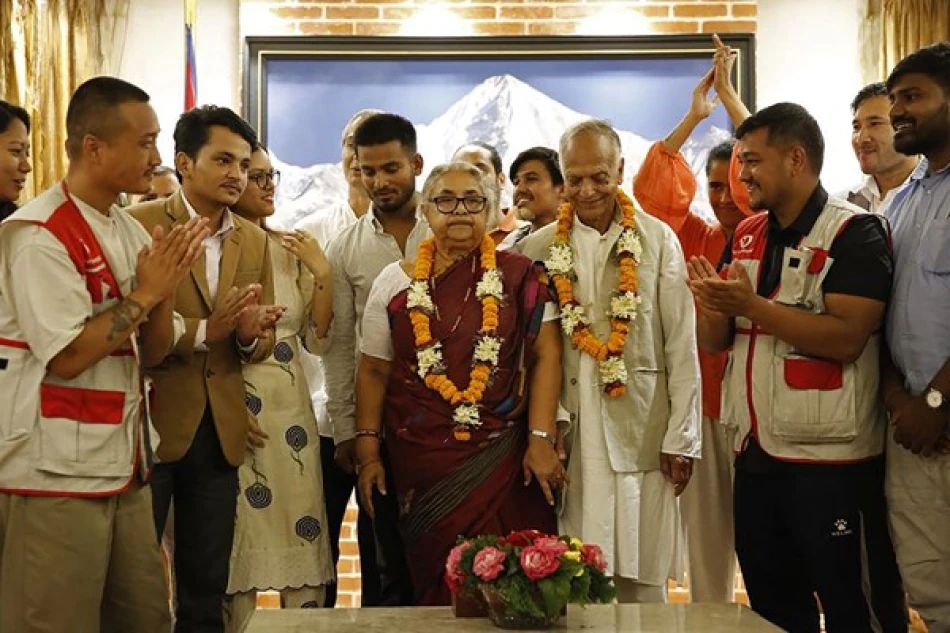
Nepal Sets Election Date, Names Interim Prime Minister Amidst Political Transition
Nepal's Political Crisis Deepens as President Dissolves Parliament, Calls March Elections
Nepal's President Ram Chandra Paudel dissolved parliament and announced new elections for March 5, 2026, following a week of mass protests that forced Prime Minister K.P. Sharma Oli to resign. The dramatic move came just hours after Paudel appointed former Supreme Court Chief Justice Sushila Karki as interim prime minister—making her the first woman to hold the country's top executive position.
A Historic Appointment Amid Political Turmoil
The appointment of Sushila Karki represents a watershed moment for Nepal, a nation where women have traditionally been excluded from top political positions despite making up over half the population. Karki, who served as Chief Justice from 2016 to 2017, brings judicial credibility to a government facing legitimacy questions after widespread street demonstrations.
The timing suggests President Paudel sought to calm protesters by breaking gender barriers while simultaneously resetting the political landscape through early elections. This dual strategy—symbolic progress coupled with democratic renewal—reflects the complex pressures facing Nepal's fragile democratic institutions.
The Collapse of Oli's Government
K.P. Sharma Oli's resignation marks the end of another short-lived government in Nepal's notoriously unstable political system. Since the end of the monarchy in 2008, Nepal has cycled through more than a dozen governments, with coalition politics and personality conflicts preventing sustained governance.
The protests that toppled Oli's administration appear to have been driven by economic grievances, including rising inflation and unemployment, rather than the ethnic or regional tensions that have historically fueled Nepal's political crises. This shift toward bread-and-butter issues suggests growing public sophistication about democratic accountability.
Regional Implications and International Concerns
Nepal's political instability carries significant implications for regional security and development. Sandwiched between China and India, Nepal has become increasingly important as both Asian giants compete for influence through infrastructure investments and diplomatic ties.
The dissolution of parliament delays key decisions on Chinese Belt and Road Initiative projects and Indian development assistance. International investors, already wary of Nepal's regulatory environment, face renewed uncertainty about long-term policy continuity.
Economic Challenges Await New Government
Whoever emerges from March's elections will inherit a challenging economic landscape. Nepal's GDP growth has slowed to around 3% annually, well below the rates needed to address widespread poverty and youth unemployment. The country also faces mounting pressure to modernize its financial sector and improve tax collection.
The interim government under Karki will likely focus on maintaining stability rather than pursuing major reforms, potentially delaying crucial economic decisions until after the elections. This extended period of policy drift could further complicate Nepal's development trajectory.
Democratic Resilience or Institutional Weakness?
Nepal's ability to manage this transition peacefully demonstrates the resilience of its democratic institutions, particularly compared to neighboring countries experiencing authoritarian backsliding. The military has remained neutral, courts continue functioning, and civil society maintains space for dissent.
However, the recurring pattern of government collapses raises questions about whether Nepal's current constitutional framework can deliver stable governance. The March elections will test whether voters reward parties promising institutional reform or revert to familiar faces offering short-term solutions.
The appointment of Nepal's first female prime minister, even in an interim capacity, signals potential for generational and gender-based political change that could reshape the country's democratic culture beyond the immediate crisis.
Most Viewed News

 Layla Al Mansoori
Layla Al Mansoori






